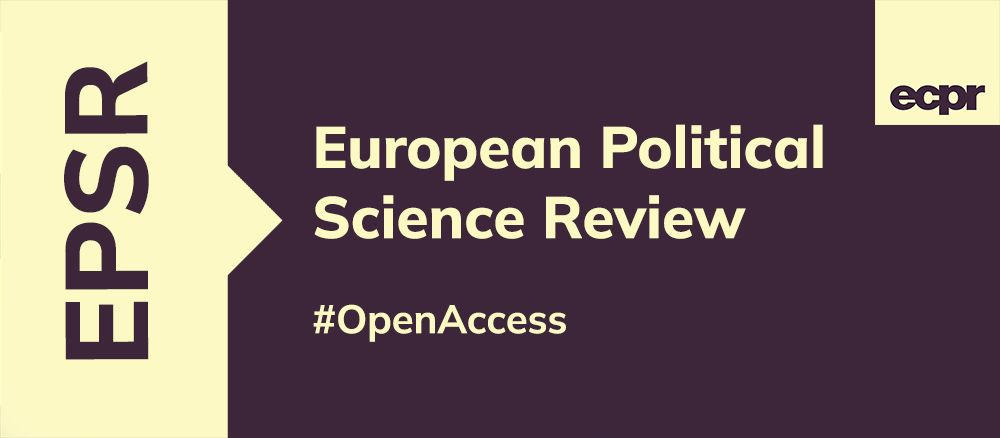
Chair in Comparative Politics, University of York
Research on far right, populism, nationalism and European Politics
Joint Editor-In-Chief of Nations and Nationalism, Political Studies
Steering Committee ECPR Extremism&Democracy
LSE PhD ..
more
Chair in Comparative Politics, University of York
Research on far right, populism, nationalism and European Politics
Joint Editor-In-Chief of Nations and Nationalism, Political Studies
Steering Committee ECPR Extremism&Democracy
LSE PhD
Reposted by Daphne Halikiopoulou
Stuart Turnbull-Dugarte & Emilia Belknap argue that most British young men reject the right
https://ukandeu.ac.uk/most-british-young-men-reject-the-far-right/

Reposted by Daphne Halikiopoulou

tinyurl.com/f73yym3b
⏳ One month left to apply
@casmudde.bsky.social
@leoniedejonge.bsky.social
@dafnoukos.bsky.social
@andreapirro.it
@albertostefanelli.bsky.social
Reposted by Daphne Halikiopoulou

Reposted by Will Jennings, Robert Huber, Daphne Halikiopoulou
➡️ shorturl.at/kVBSq
Reposted by Daphne Halikiopoulou

Reposted by Daphne Halikiopoulou

new episode with @podmalm.bsky.social
www.politicalphilosophypodcast.com/global-immig...
Reposted by Daphne Halikiopoulou, M Josep

➡️ The Limits of Alarm: How Climate Scenarios Fail to Increase Willingness to Act and Pay for Climate Change Policies, published at @psrjournal.bsky.social co-authored with @mguinjoan.bsky.social & @celiaestruch.bsky.social journals.sagepub.com/doi/10.1177/... (1/n)

Reposted by Vincent Tiberj, Daphne Halikiopoulou

Reposted by Daphne Halikiopoulou

The event will be held at the University of Bologna from 6 to 10 July 2026.
Information: ecpr.eu/Events/353

🇮🇹 The event will be hosted by @unibo.it, from 6 to 10 July 2026.
🔗 ecpr.eu/Events/353
Reposted by Alexi Gugushvili, Daphne Halikiopoulou
Reposted by Daphne Halikiopoulou
Reposted by Robert Huber, Daphne Halikiopoulou

A new study by @dafnoukos.bsky.social @chvrakopoulos.bsky.social & C.Arndt finds that resistance to #EnvironmentalProtection is fueling a divide between urban greens and rural #FarRight voters across #WesternEurope
Reposted by Tim Bale, Daphne Halikiopoulou

The total number of far-right seats in the Tweede Kamer:
2021: 28
2023: 41
2025: 42 👈
And I don’t even count BBB here, which has radicalized significantly in the last year.
Reposted by Daphne Halikiopoulou, Davide Vampa

Far-right against green: the re-emergence of geographically defined voting patterns and the new environment cleavage in Western Europe - https://cup.org/3LB7xpl
- @dafnoukos.bsky.social, @chvrakopoulos.bsky.social & Christoph Arndt
#FirstView
Reposted by Daphne Halikiopoulou
Reposted by Will Jennings, Vincent Tiberj, Daphne Halikiopoulou

Emilia & I use data from @britishelectionstudy.com to correct the atomistic fallacy in people's understanding the Reform UK gender gap
ukandeu.ac.uk/most-british...
🔗 etui.org/ZV9
Experts @dafnoukos.bsky.social (University of York) and Tim Vlandas (University of Oxford) will be joining us for this lunchtime discussion to explain 🧵👇

Reposted by Kurt Vandaele, Daphne Halikiopoulou

🔗 etui.org/ZV9
Experts @dafnoukos.bsky.social (University of York) and Tim Vlandas (University of Oxford) will be joining us for this lunchtime discussion to explain 🧵👇
Climate Policy Costs, Regional Politics, and Backlash against International Co-operation - https://cup.org/47BYSeS
- @patrickbayer.bsky.social & @fgenovese.bsky.social
#OpenAccess

You'll find everything you love (hate?) like public perceptions of climate policy risk, IO backlash, devolution concerns, and trust politics in the UK.
Tldr: climate blacklash should be read through regional lenses.
Past thread: bsky.app/profile/fgen...
Reposted by Simon Hix, Ben H. Ansell, Stephen P. Jenkins , and 14 more Simon Hix, Ben H. Ansell, Stephen P. Jenkins, Steven Van de Walle, Tim Bale, Efrén O. Pérez, Benjamin Braun, Valerie Mueller, Miles Corak, Jane Green, Damien Bol, Nazita Lajevardi, Christopher Barrie, Federica Genovese, Daphne Halikiopoulou, Joost van Spanje, Roman Senninger
We're looking for a *Full or Associate Professor of Political Science and Public Policy* to join the LSE School of Public Policy
Please share!
jobs.lse.ac.uk/Vacancies/W/...

How much more research do journalisten, politicians, pundits and strategists need before they finally change course?
Reposted by Damian Trilling, Daphne Halikiopoulou

I was lucky enough to present some new causal work on Friday at LSE showing that the PP does better when it signals distinctiveness from VOX.
~1.5K tests, same result. Rejecting far-right benefits centre-right
We show that citizens who perceive their in-group to be disadvantaged express lower support for democracy and higher openness towards authoritarian alternatives!
tinyurl.com/y78hj253 @espol-lab.bsky.social @lifbi.bsky.social




